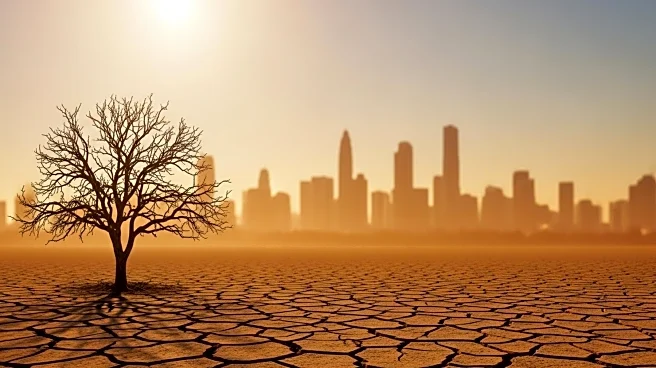What's Happening?
A recent analysis by the International Institute for Environment and Development (IIED) reveals that the world's major capital cities are experiencing a 25% increase in extremely hot days compared to the 1990s. This rise in temperature is attributed to the ongoing climate crisis, primarily driven by fossil fuel emissions. The study highlights that cities such as Washington DC, Madrid, Tokyo, and Beijing have seen a significant increase in days with temperatures exceeding 35°C. The analysis indicates that from 1994-2003, these cities averaged 1,062 hot days annually, which increased to 1,335 days from 2015-2024. The report underscores the urgent need for governments to implement measures to protect urban populations from the adverse effects of extreme heat, particularly in low-income and unplanned communities.
Why It's Important?
The increase in extremely hot days poses significant challenges for urban populations, particularly affecting the elderly and economically disadvantaged groups. The urban heat island effect exacerbates the impact of rising temperatures, leading to health risks and increased mortality rates. The report warns that without immediate action, millions of city dwellers will face dangerous living conditions. The findings emphasize the need for comprehensive urban planning and infrastructure improvements, such as better insulation, ventilation, and the creation of shaded areas. The situation calls for a coordinated response from governments to mitigate the effects of climate change and protect vulnerable populations.
What's Next?
The Global Center on Adaptation has launched 'The Heat is On' campaign to promote solutions that can save lives and protect livelihoods. This initiative aims to implement practical measures such as cooling centers, climate-smart work schedules, and early-warning systems. The campaign highlights the importance of investing in adaptive strategies to address the immediate and long-term impacts of extreme heat. As the UN's climate summit, Cop30, approaches, there is an opportunity for global leaders to prioritize climate adaptation and resilience in urban areas. The report calls for increased funding and policy support to enhance the capacity of cities to withstand the challenges posed by climate change.
Beyond the Headlines
The rise in extreme heat days is not just a local issue but a global challenge that requires international cooperation and commitment. The findings highlight the ethical responsibility of developed nations to support developing countries in building climate resilience. The report also points to the need for innovative governance systems that involve local communities in decision-making processes. As climate change continues to reshape urban environments, there is a growing recognition of the need for sustainable development practices that prioritize environmental and social equity.










